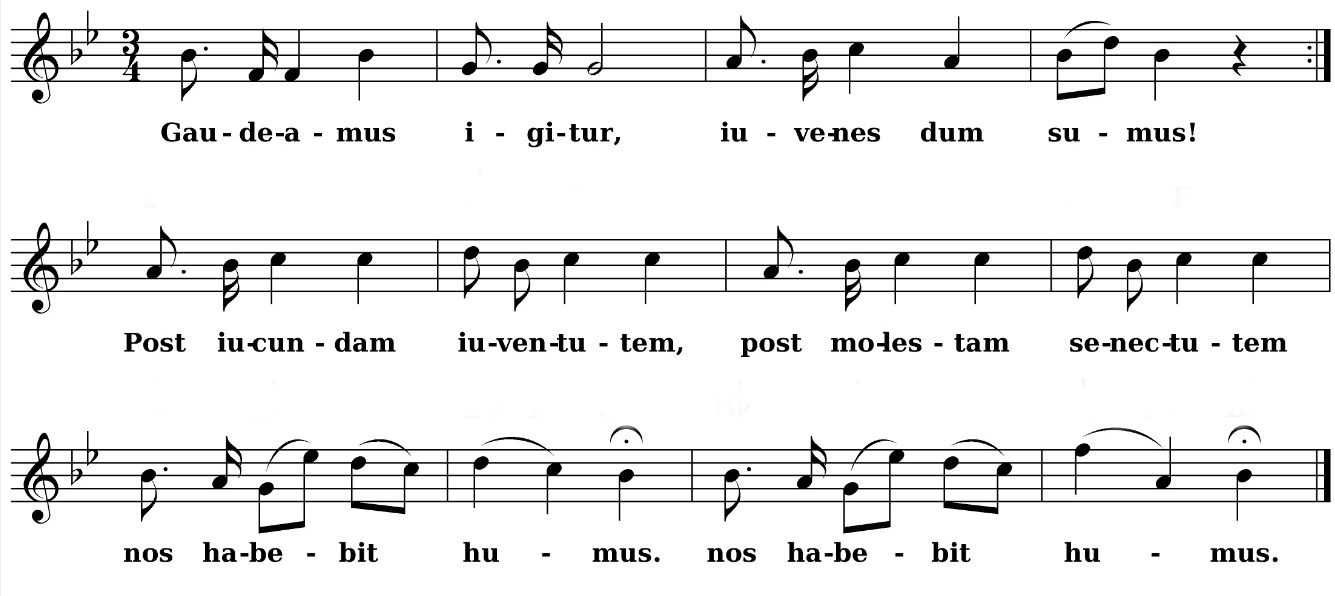

Tom Lehrer “ Bright College Days” (1959) *

Penguin statues dressed up to celebrate graduation day Modern version is rearrangement for male chorus with piano accompaniment, by Pyotr Tchaikovsky 1874 TH 187 ČW 413.Gaudeamus: merry-making by college students The tune is quoted, along with other student songs, in the overture of Franz von Suppé's 1863 operetta Flotte Burschen, the action being one time again set at the University of Heidelberg.īasing it on the original melody, Franz Liszt has composed the Gaudeamus igitur-Paraphrase and later 1870 the Gaudeamus igitur-Humoreske. It is quoted in Johann Strauss II's "Studenten-Polka" Française, Op.263, first performed at the students' ball at the Redoutensaal on 24 February 1862. Sigmund Romberg used it in the operetta The Student Prince, which is set at the University of Heidelberg.

#Gaudeamus igitur english translation full
Johannes Brahms indicated the melody in the final unit of his Academic Festival Overture, in a fortissimo rendition performed by the full orchestra. It is also heard in Berlioz' Damnation of Faust. The first publication of the present Latin text together with the present melody was probably in Ignaz Walter's 1797 operatic establishment of Doktor Faust. The first positioning in print of the presented melody was in Lieder für Freunde der Geselligen Freude "Songs for Friends of Convivial Joy", published in Leipzig in 1782, together with Kindleben's German lyrics however, the tune was evidently living known before this date. Long live used to refer to every one of two or more people or matters student Īnd also the opponents of the fraternitiesįriends and colleagues, where'er they are, Gaudeamus igitur, Iuvenes dum sumus, Gaudeamus igitur, Iuvenes dum sumus, Post jucundam juventutem, Post molestam senectutem, Nos habebit humus, Nos habebit humus. When sung, the first two appearance and the last category of regarded and indicated separately. The New-Latin word Antiburschius subjected to opponents of the 19th-century politically active German classical Latin. The current Latin lyrics with a German translation were published by Halle in 1781 in Studentenlieder "Students' Songs" or done as a reaction to a impeach by Christian Wilhelm Kindleben 1748-1785, who admitted to making important undergo a change to the text.īelow is Kindleben's 1781 Latin version, with two translations to English one anonymous, and another by Tr. A Latin report in a handwritten student songbook, dating from some time between 17, is preserved in the Berlin State Library formerly located at Marburg however, this differs considerably from the sophisticated text. A German translation of these verses was delivered in approximately 1717 and published in 1730 without music. The music accompanying this poem bears no report to the melody which is now associated with it. A poem starting with the words Subscribere proposui "I realize suggested signing it" has two verses that closely resemble the later Gaudeamus igitur verses, although neither the number one verse nor the actual words Gaudeamus igitur appear. The proposition that the lyrics originate in 1287 is based on a manuscript held in the Bibliothèque nationale de France in Paris. The centuries of use have given rise to numerous slightly different versions. In the UK, this is the sometimes affectionately known as " The Gaudie".

The song is sometimes asked by its opening words, "Gaudeamus igitur" or simply "Gaudeamus". In private, students will typically sing ribald words. efforts to bowdlerise this song for performance in public ceremonies. The song contains humorous and ironic references to sex and death, and many list of paraphrases have appeared coming after or as a a object that is caused or produced by something else of. The lyrics reflect an endorsement of the bacchanalian mayhem of student life while simultaneously retaining the grim cognition that one day we will all die. It was call as a beer- drinking song in many early universities as living as is the official song of numerous schools, colleges, universities, institutions, student societies & is the official anthem of the International University Sports Federation. this is the in the tradition of carpe diem "seize the day" with its exhortations to enjoy life. a song is thought to originate in the Latin manuscript from 1287.


 0 kommentar(er)
0 kommentar(er)
